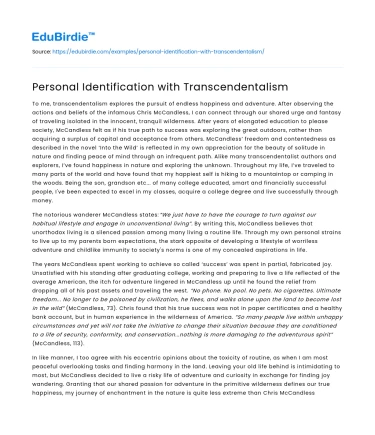To me, transcendentalism explores the pursuit of endless happiness and adventure. After observing the actions and beliefs of the infamous Chris McCandless, I can connect through our shared urge and fantasy of traveling isolated in the innocent, tranquil wilderness. After years of elongated education to please society, McCandless felt as if his true path to success was exploring the great outdoors, rather than acquiring a surplus of capital and acceptance from others. McCandless’ freedom and contentedness as described in the novel ‘Into the Wild’ is reflected in my own appreciation for the beauty of solitude in nature and finding peace of mind through an infrequent path. Alike many transcendentalist authors and explorers, I’ve found happiness in nature and exploring the unknown. Throughout my life, I’ve traveled to many parts of the world and have found that my happiest self is hiking to a mountaintop or camping in the woods. Being the son, grandson etc... of many college educated, smart and financially successful people, I've been expected to excel in my classes, acquire a college degree and live successfully through money.
The notorious wanderer McCandless states: “We just have to have the courage to turn against our habitual lifestyle and engage in unconventional living”. By writing this, McCandless believes that unorthodox living is a silenced passion among many living a routine life. Through my own personal strains to live up to my parents born expectations, the stark opposite of developing a lifestyle of worriless adventure and childlike immunity to society's norms is one of my concealed aspirations in life.
Save your time!
We can take care of your essay
- Proper editing and formatting
- Free revision, title page, and bibliography
- Flexible prices and money-back guarantee
The years McCandless spent working to achieve so called ‘success’ was spent in partial, fabricated joy. Unsatisfied with his standing after graduating college, working and preparing to live a life reflected of the average American, the itch for adventure lingered in McCandless up until he found the relief from dropping all of his past assets and traveling the west. “No phone. No pool. No pets. No cigarettes. Ultimate freedom... No longer to be poisoned by civilization, he flees, and walks alone upon the land to become lost in the wild” (McCandless, 73). Chris found that his true success was not in paper certificates and a healthy bank account, but in human experience in the wilderness of America. “So many people live within unhappy circumstances and yet will not take the initiative to change their situation because they are conditioned to a life of security, conformity, and conservation...nothing is more damaging to the adventurous spirit” (McCandless, 113).
In like manner, I too agree with his eccentric opinions about the toxicity of routine, as when I am most peaceful overlooking tasks and finding harmony in the land. Leaving your old life behind is intimidating to most, but McCandless decided to live a risky life of adventure and curiosity in exchange for finding joy wandering. Granting that our shared passion for adventure in the primitive wilderness defines our true happiness, my journey of enchantment in the nature is quite less extreme than Chris McCandless. Civilization is both a shared sickness for both Chris and I, which is one reason I admire his courage to step outside his known world and start a native life. The times I feel as if my current state or path is tainted with grief, I turn to the simplicity of nature, similar to McCandless. While the challenges McCandless faced during his expedition were stark differences from my personal ones, the freedom we share while in the solitude of traceless nature is visible.
Overall, my own love for the wild and pure fascination with the unexpected is comparable to the transcendentalist Chris McCandless. He found happiness not from money and education, but from wandering and meeting new people on his adventures. He felt free, which was something he or I have never truly felt with the restraints of society's expectations. Our conjoined wanderlust for the happiness found in nature is how I identify with transcendentalism.






 Stuck on your essay?
Stuck on your essay?

